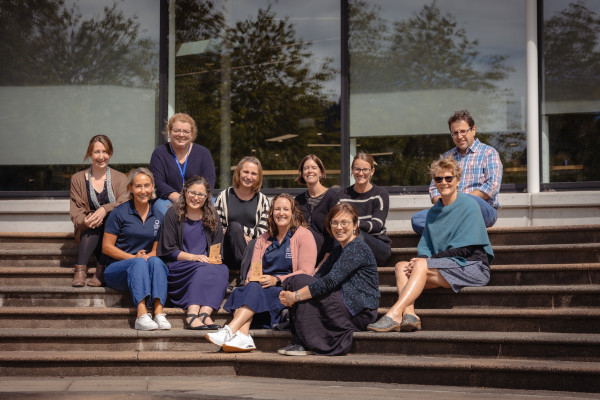- Tūhono home Hoki ki Tūhono
-
- Staff Directory
- Chief Executive Office Auckland International Office Corporate Services Finance Campus Services Functions and Catering Information Systems and Support Marketing, Communications and Engagement Learner Journey Academic Registry International Learner Services Te Punaka Ōwheo
- Learner Experience Academic Excellence Central Campus College of Community Development and Personal Wellbeing College of Engineering, Construction and Living Sciences College of Health College of Work Based Learning Open Education Resource/OERu Research and Postgraduate Studies Te Maru Pumanawa | College of Creative Practice and Enterprise
- Māori Development and Kaitohutohu Office People, Culture & Safety People and Culture Childcare Centre Te Ama Ako | Learning and Teaching Development Wellbeing and Safety Auckland Staff Directory Executive Office Academic Corporate Services Marketing and Business Development Human Resources Campus Quality and Programme Development
-
 Our people make a better world
Our people make a better world
We build the capabilities of individuals, organisations and communities and help them to realise their potential.
Staff Directory
-
- Tools
- Academic Integrity Declaration Form AIC applications dashboard Approved programmes Approved programme fees Centralised assessement repository Chemwatch Course evaluation and surveys CRM applications CRM customer service hub Delegations policy/process Disability and neurodiversity Dynamics 365 (CRM) EBS Ontrack EBS Report Email security personal portal Employment Matters / Solarworkplace / Performance reviews eTaxi eTV
- Financial variance reporting Hidden Disabilities Sunflower programme FCM travel intranet InPlace International entry requirements Knowledgebase articles Learner support dashboards Linkedin Learning Log a job with Marketing Login as an applicant Media consent form Microsoft 365 Moderation App Moodle OP Docs OP Docs - Publishing OP Image Libraries Performance Excellence Portal Product Evaluation Panel
- Policy Library Privacy Programme and course design/development Qualtrics XM RDS Remote access support portal Research Database Robertson Library Staff FAQs about graduation Status of Programmes Student intranet (Kāpehu) Study Abroad info for learners Taha Talks (videos for students) Tūhauora I Wellbeing resources Uniprint Vault Webexpenses Auckland tools
-
 Vault
Had an accident or near miss?
Log it here
Vault
Had an accident or near miss?
Log it here
-
- Communities
- Community AI Steering Committee Ally Network EBS Community of Interest EdTech Champions Health & Wellbeing Research Internal Evaluation Neurodiversity Professional Team Professoriate Proud@OP Student Support Website Advisory Group Web Champions Working under the Rainbow Project Learner Capability Trade Training Centre
- Committee Academic Committee Animals@OP Diversity and Equity Doctor of Professional Practice Committee Kaunihera Whakahaere - Leadership Council Internal Evaluation Learning & Teaching Leadership Team Library Committee Mental Health and Wellbeing Advisory Group Otago Polytechnic Board of Directors Pastoral Care Code Committee Programme Approvals Committee Research and Postgraduate Committee Research Ethics Committee Staff Subcommittee
- Think Tanks Mātauraka Our learners achieve educational success Pūtea Our financial success Tākata Our people, our team, our community Tiriti Our active commitment as a Treaty partner Tūroa Our commitment to be a sustainable and responsive organisation
-
 Create a community
Create a community
Do you have a community, committee or project that you'd like represented here?
Communities
-
- About OP
- Keep up to date All news All events All notices All blogs Share your info Create a news article Create an event Create a notice Create a blog
- Community and Partnerships Alumni and friends Education Foundation Operational information Academic calendar 2025 Academic calendar 2026 Current vacancies Dunedin campus map Our policies Topical FAQs
- Who we are About OP Commemorative sites Māori Strategic Framework OP merchandise Our history Our strategic priorities Pasifika Strategic Framework (2025-2030) Vision and Values Working for us OP job opportunities Wellbeing Calendar Working at OP
-
New Zealand: 0800 762 786
contact us
International: +64 3 477 3014
Engaging with poverty: A New Zealand occupational therapy perspective
Author: Heidi Cathcart
Supervisors: Mary Butler
Engaging with poverty: A New Zealand occupational therapy perspective
Heidi Cathcart
27 November 2019
Abstract
The aim of this research was to explore how occupational therapists engage with issues of poverty in their practice. Using an interpretive descriptive methodology, interviews were carried out with nine occupational therapists from a range of practice areas across New Zealand. Participants were asked to reflect on what they have seen in relation to poverty in their practice, the impact of poverty on their client’s occupational participation and engagement with therapy, how therapists are able to respond to poverty within their roles, and specific challenges they face when engaging with clients who are impacted by poverty.
The participants in this research demonstrated that they engage with poverty in a holistic way. Poverty was identified as a multifaceted issue that encompasses a range of personal and social factors, not simply limited to inadequate finances or physical resources. Poverty impacts clients of occupational therapy, carers and support staff that work alongside occupational therapy clients, community organisations and charities that support vulnerable members of society, and even the very services that employ occupational therapists.
When faced with poverty in practice, occupational therapists engage with their hearts, heads, and hands. That is, they take the time to understand and empathise with their client's situations; they grapple with issues of poverty, specifically as these issues relate to ethics, justice and human rights; and finally, they act in practical ways to address issues of poverty. The strategies used to address poverty for their clients were the same tools and strategies used by occupational therapists every day in both the presence and the absence of poverty – referrals, documentation, clinical reasoning, peer support and supervision, advocacy, and occupational engagement. Participants also reflected on the way in which personal experiences and professional values shape the way they engage with issues of poverty and deprivation.
While this study has demonstrated the ways in which occupational therapists in New Zealand already engage with poverty in their practice, there was also a sense from most of the participants that occupational therapy is not yet doing enough to engage with and address the ways in which poverty violates human and occupational rights. This research wishes first to celebrate the tireless work that occupational therapists in New Zealand are doing to engage with and address poverty in their practice, and then to stimulate discussion about poverty in occupational therapy practice, both about the successes and the challenges of engaging with this widespread injustice. Recommendations from this research include strengthening occupational therapy discourse about poverty, challenging the way in which occupational therapy and occupational science think about and conceptualise poverty, expanding occupational therapy practice to address poverty more effectively, and evaluating the responsiveness of occupational therapy to issues of poverty. It is hoped that these recommendations will inspire and equip occupational therapists to take further action to engage with and address poverty for individuals, families and whanau, communities, and New Zealand society as a whole.
Keywords: occupational therapy, poverty, New Zealand
Heidi Cathcart's thesis was supervised by Mary Butler.
Licence
This thesis is available under a Creative Commons Attribution-NonCommercial-NoDerivatives licence CC BY-NC-ND 4.0 International